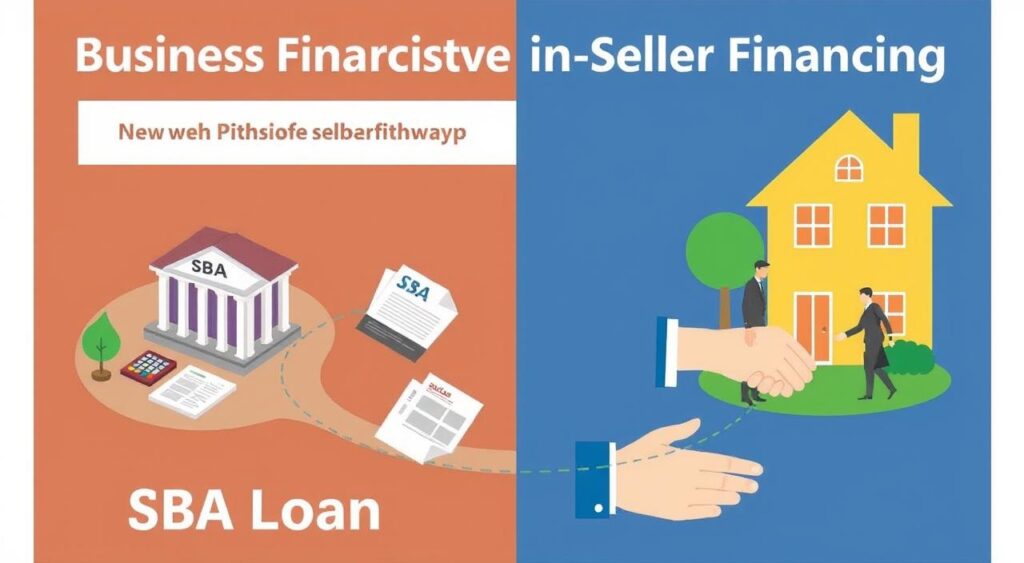Did you know that small business acquisitions in the United States have surged by 46% over the past year? Many entrepreneurs are using SBA loans to finance their purchases. This shows a big trend in strategic business acquisitions, especially among small and medium-sized enterprises (SMEs).
This article is a detailed guide on getting an SBA loan for a $1.9 million business purchase. We’ll cover what you need to qualify, the loan’s benefits, and how to apply. You’ll also learn about valuation, deal structuring, financing options, and strategies after the purchase.
Key Takeaways
- Understand the eligibility criteria and benefits of using an SBA loan for business acquisition
- Learn how to properly value the target business and structure the deal
- Explore financing options, including SBA loans and seller financing
- Conduct thorough due diligence to mitigate risks in the business acquisition process
- Develop effective post-acquisition integration and growth strategies
Understanding the SBA Loan for Business Acquisition
The Small Business Administration (SBA) loan program is great for buying an existing business. It offers competitive rates, flexible terms, and lower down payments than regular loans. This makes it easier for entrepreneurs to get the funds they need.
Eligibility Criteria for SBA Loans
To get an SBA loan, you must meet some requirements. These include:
- Business size requirements (typically less than 500 employees)
- Demonstration of sufficient industry experience and management expertise
- Satisfactory credit history and personal credit score
- Ability to provide a minimum equity injection, often around 10-20% of the total purchase price
Benefits of Using an SBA Loan for Business Purchase
Using an SBA loan for buying a business has many benefits. These include:
- Lower Down Payments: SBA loans need only 10-20% down, less than the 20-30% for regular loans.
- Longer Repayment Terms: SBA loans can last up to 25 years. This means smaller monthly payments and better cash flow.
- Competitive Interest Rates: SBA loan rates are better than those of regular loans. This helps lower the cost of buying a business.
By using an SBA loan, small business owners can buy a business and set it up for success. The SBA loan to buy an existing business for 1.9m and the small business administration lending program are good choices. They help entrepreneurs grow their equity injection for business purchase.
SBA Loan to Buy an Existing Business for 1.9m
Buying an existing business can be smart, but getting the money needed is hard. An SBA loan is a good choice for buying a company for $1.9 million. These loans are backed by the government and offer many benefits for those wanting to buy a business.
SBA loans can be from $500,000 to $5 million. They have lower interest rates than regular bank loans. You can pay them back over 25 years, making monthly payments easier. This makes SBA loans a great choice for borrowing to acquire a company and for a smooth asset purchase agreement.
| Loan Amount | Interest Rate | Repayment Term |
|---|---|---|
| $500,000 – $5,000,000 | Typically lower than traditional bank loans | Up to 25 years |
To get an SBA loan to buy an existing business for $1.9M, you need good credit, a solid plan, and enough collateral. The application takes time, but a skilled lender can help speed it up and boost your chances of getting approved.
“An SBA loan can be a game-changer for those looking to acquire an existing business. The flexible terms and competitive rates make it a valuable financing option.”
Understanding the SBA loan process and preparing well can help entrepreneurs buy a company. This can take their business to new levels.
Preparing for the Loan Application Process
Applying for an SBA loan to buy an existing business for 1.9m needs careful preparation. You must know what documents are required for an small business acquisition loan. This knowledge is key to a successful application.
Key Documents Needed for SBA Loan Application
- Business plan detailing the acquisition strategy and growth plans
- Financial statements, including income statements, balance sheets, and cash flow statements, for the target business
- Personal financial statements and credit profiles for all business owners and key stakeholders
- Detailed information on the business being acquired, such as operations, customer base, and competitive landscape
- Collateral and asset information, including appraisals and proof of ownership
- Resume and background information for the business owners and management team
Having these documents ready in advance can make the sba loan to buy an existing business for 1.9m application smoother. It shows lenders you’re serious and ready to move forward.
| Document | Purpose |
|---|---|
| Business Plan | Outlines the acquisition strategy and growth plans for the target business |
| Financial Statements | Provides a comprehensive view of the target business’s financial health and performance |
| Personal Financial Statements | Demonstrates the financial stability and creditworthiness of the business owners |
| Business Information | Gives the lender a deeper understanding of the target business’s operations, customers, and competition |
| Collateral and Assets | Provides the lender with assurance that the loan is secured by valuable assets |
| Owner/Management Background | Showcases the experience and expertise of the business’s leadership team |
By preparing these important documents, you boost your chances of getting an SBA loan to buy an existing business for 1.9m. This is a big step towards your entrepreneurial dreams.
Valuing the Target Business
When you want to buy a business for $1.9 million, figuring out its value is key. This step helps you make a smart choice and pay a price that matches the business’s worth.
To find the business’s value, you can use different valuation methods. These include looking at the company’s assets, income, and how it compares to others in the industry. This way, you get a full picture of what the business is worth.
- The asset-based approach looks at the value of things like equipment, inventory, and buildings.
- The income-based approach checks how much money the business can make, including its growth and risks.
- The market-based approach compares the business to others that have sold recently, showing its market value.
Using these methods together helps you understand the business’s value. This knowledge lets you make a smart choice and get a good deal when you finance the purchase.

“Accurate valuation is the foundation of a successful business acquisition. It empowers you to make a strategic investment that aligns with your financial goals.”
Finally, carefully valuing the target business is a key part of getting a commercial real estate acquisition loan. It ensures you invest wisely and sets you up for success in the long run.
Structuring the Deal: Asset vs. Stock Purchase
Entrepreneurs have two main choices when buying a business: asset purchase or stock purchase. Each option has its own pros and cons. The decision depends on tax implications, liability transfer, and the buyer’s goals.
Asset Purchase Agreement Considerations
An asset purchase lets the buyer get specific assets like equipment and intellectual property. The seller keeps some liabilities. The agreement outlines the deal’s terms, including:
- What assets are being transferred
- How liabilities are handled
- Details on intellectual property
- Warranties from the seller
- When and how the deal will close
This method gives the buyer control over the assets. It’s good for picking the best parts of the business. But, it can make the deal more complex and time-consuming.
“The asset purchase agreement is the cornerstone of an asset-based acquisition, defining the scope of the transaction and allocating risks between the buyer and seller.”
Understanding an asset purchase agreement is key when getting an sba loan to buy an existing business for 1.9m. This agreement is crucial for the asset vs. stock purchase choice. It affects the business’s long-term success.
Financing Options: SBA Loan vs. Seller Financing
Entrepreneurs have two main options for financing a $1.9 million business purchase: SBA loans and seller financing. Each has its own benefits and drawbacks. It’s important to choose the right one for your deal and financial goals.
SBA Loans for Business Purchases
SBA loans are backed by the U.S. Small Business Administration. They are a top choice for small business acquisition loans. These loans often have lower interest rates and longer repayment periods. But, the application process is complex, and there are strict eligibility criteria.
Seller Financing: A Flexible Alternative
Seller financing lets the current owner provide a loan to the buyer. It’s flexible and might be better if you don’t qualify for SBA loans. However, the terms can vary a lot. It’s crucial to negotiate well to get a fair deal.
| Criteria | SBA Loan | Seller Financing |
|---|---|---|
| Loan Terms | Typically longer repayment periods (up to 25 years) | Negotiable, often shorter repayment periods |
| Interest Rates | Generally lower than conventional loans | Varies based on negotiations with the seller |
| Collateral Requirements | Typically require collateral, such as business assets or personal property | May have more flexible collateral requirements |
| Approval Process | More extensive, with detailed documentation and underwriting | Often simpler and faster than SBA loan application |
When deciding between SBA loan vs. seller financing for a $1.9 million purchase, consider the pros and cons. Look at loan terms, interest rates, and collateral needs. Also, think about how it fits your financial goals and risk level. Getting advice from experts like accountants and lawyers can help you make the best choice for your business.

Due Diligence: Mitigating Risks in Business Acquisition
When you buy a business for $1.9 million with an SBA loan, it’s key to do a deep dive into the business. This helps spot and fix any problems before you buy. It’s a way to make sure you’re making a smart choice and that the deal will work out well.
Conducting Thorough Due Diligence
The due diligence for a business acquisition looks at several important areas:
- Financial Analysis: Look closely at the company’s money matters, like its financial reports, cash flow, and assets. This helps you see if the business is healthy and if there are any big issues.
- Operational Review: Check how the company runs, including its team, employees, and how it makes things. Make sure it fits with your plans.
- Legal and Compliance: Make sure the company follows the law and has the right papers. Look for any legal problems or issues with licenses.
- Market and Competitive Analysis: See where the company stands in the market. Understand its customers and competitors to spot chances for growth.
Doing a thorough due diligence helps you really know the business. It lets you find and fix problems before you use an SBA loan to buy an existing business for 1.9m.
“Thorough due diligence is the foundation of a successful business acquisition. It allows you to make an informed decision and plan for a smooth integration process.”
| Key Areas of Due Diligence | Potential Risks to Identify | Mitigation Strategies |
|---|---|---|
| Financial Analysis | Undisclosed liabilities, inaccurate financial reporting, cash flow issues | Verify financial statements, perform in-depth analysis, negotiate deal terms to protect against liabilities |
| Operational Review | Inefficient processes, outdated technology, key employee turnover | Assess operational capabilities, identify areas for improvement, plan for integration and talent retention |
| Legal and Compliance | Regulatory issues, intellectual property disputes, pending litigation | Conduct legal and compliance review, consult with legal experts, structure the deal to minimize legal risks |
| Market and Competitive Analysis | Declining market share, changing customer preferences, intense competition | Evaluate market trends, assess competitive landscape, develop strategies to enhance the company’s market position |
Post-Acquisition Integration and Growth Strategies
Buying a business for $1.9 million with an SBA loan is just the start. The real challenge is to smoothly blend the new business into yours. You also need to grow it to get the most out of your investment.
Integrating the new business well means matching cultures, making processes smoother, and using both companies’ strengths. It’s important to talk openly, fix any problems, and make sure everyone works together towards the same goals.
To grow your business after buying it, think about these strategies:
- Cross-selling and up-selling – Find ways to sell your products or services to the new company’s customers, and theirs to yours.
- Operational optimization – Find the best ways to do things, make processes the same, and cut out what’s not needed to be more efficient and profitable.
- Geographic expansion – Use the new company’s market presence to grow your business and reach more customers.
- Product or service diversification – Look for chances to offer more products or services to meet a wider range of customer needs.
By managing the integration well and using smart growth plans, you can turn your $1.9 million SBA loan into a thriving business.
| Key Considerations | Strategies for Success |
|---|---|
| Organizational Culture Alignment | Foster open communication, address operational inefficiencies, and empower employees to work cohesively. |
| Process Optimization | Identify and implement best practices, standardize processes, and eliminate redundancies. |
| Synergy Leveraging | Explore cross-selling, up-selling, geographic expansion, and product/service diversification opportunities. |
“Successful post-acquisition integration is the key to unlocking the full potential of your $1.9 million investment.”
Conclusion
In this guide, we’ve looked at how to get an SBA loan to buy an existing business for $1.9 million. We covered what you need to qualify, the benefits, and how to apply for SBA loans. Now, you know the financing options for buying a small business.
We also talked about how to value the business you want to buy. We discussed the best ways to structure the deal and how to go through the due diligence process. This helps avoid risks. We also looked at other financing options, like small business acquisition loans and business purchase financing.
This guide is a roadmap for those wanting to buy a business with an SBA loan. It helps you understand the key steps and things to consider. With this knowledge, you can confidently pursue the SBA loan to buy an existing business for 1.9m. This increases your chances of success in the competitive business market.
FAQ
What are the eligibility criteria for an SBA loan to buy an existing business for $1.9 million?
To get an SBA loan for a $1.9 million business, you need to meet certain criteria. You must be a for-profit business with good credit. You also need a solid business plan and meet the SBA’s size standards.
The business you’re buying must be viable and ongoing. It should have a good track record.
What are the benefits of using an SBA loan for a business purchase?
Using an SBA loan for a $1.9 million business has many benefits. You can put down as little as 10% and repay over 25 years. The interest rates are competitive.
SBA loans also have flexible collateral requirements. This is different from regular business loans.
What is the typical loan amount, interest rate, and repayment term for an SBA loan to buy a $1.9 million business?
SBA loans for business acquisitions can go up to $5 million. The interest rates are between 5-8%. Repayment terms can last up to 25 years.
This depends on the loan’s use and the collateral. It’s important to understand these terms.
What documentation is required for an SBA loan application to purchase a $1.9 million business?
To apply for an SBA loan for a $1.9 million business, you need several documents. You’ll need a business plan and financial statements for both you and the target business.
You’ll also need tax returns, a detailed business description, and collateral information. This helps the SBA assess your loan application.
How should I go about valuing the target business I want to acquire for $1.9 million?
Valuing a $1.9 million business is key. Use different valuation methods like asset, income, and market-based approaches. This ensures a fair price.
Consider the business’s financials, market position, and growth potential. These factors are important in determining the value.
What are the key considerations when structuring the deal as an asset purchase versus a stock purchase?
When buying a $1.9 million business, you can choose between asset or stock purchase. Asset purchases are more flexible but can be complex. Stock purchases are simpler but may have legal and tax issues.
The details of the asset purchase agreement are crucial. They affect the deal’s structure and outcome.
How do I compare the financing options of an SBA loan versus seller financing for a $1.9 million business acquisition?
Both SBA loans and seller financing are good for a $1.9 million business purchase. SBA loans offer lower down payments and longer terms. They also have competitive rates.
However, SBA loans require more documentation. Seller financing is more flexible but may have higher rates and shorter terms.
What are the key areas of focus during the due diligence process when acquiring a $1.9 million business?
Due diligence is critical when buying a $1.9 million business. Focus on financial reviews, operational assessments, market analysis, and legal checks.
Review contracts, intellectual property, and potential liabilities. This ensures a thorough understanding of the business.
What are some important post-acquisition integration and growth strategies to consider after buying a $1.9 million business?
After buying a $1.9 million business, focus on integration and growth. Align cultures, streamline processes, and leverage synergies. Develop strategic plans for revenue growth and profitability.
This approach helps the business thrive under new ownership.

